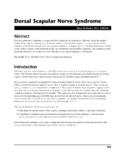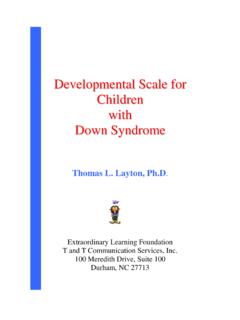Transcription of Asperger Syndrome Fact Sheet 2 - Dr. Kathy Borchardt
1 Kathy Borchardt , , CLINICAL PSYCHOLOGIST 1212 S. NAPER BLVD., #119 NAPERVILLE, IL 60540 PHONE: 630- 680- 5494 FAX: 630- 369- 5989 Asperger Syndrome fact Sheet What is Asperger Syndrome (AS), also known as Asperger 's Disorder (AD)? Like all autism spectrum disorders, AS is defined by social impairment, communication deficits, and repetitive patterns of behavior, interests, or activities; but unlike autism, intellectual ability and syntactical speech are often typical of people without autism. The core features of Asperger 's include: Social interaction deficits: The social communication deficits in highly functioning persons with Asperger Syndrome (AS) include: --lack of the normal back and forth conversation;. --lack of typical eye contact, body language, and facial expression;. --difficulty forming and maintaining relationships. Individuals with AS may enjoy associating with people but are unable to maintain more that a superficial level of relating to them and are rarely able to respond empathetically to others.
2 Lacking self-consciousness, they are usually unaware of their social strangeness and may become overly sensitive to criticism or suspicious of others, sometimes leading to a diagnosis of paranoid ideation. Difficulty with verbal and nonverbal communication: Their speech patterns tend to be monotonous, stilted or gauche, and they exhibit little ability for small talk or humor. They have a tendency to use odd words and focus on a topic of personal interest. They display minimal facial expression, except for strong emotions such as anger, and few gestures. Comprehension of the nonverbal communication of others is poor. People with Asperger Syndrome may speak very fluently but they may not take any notice of the reaction of people listening to them, continuing to talk about one topic regardless of the listener's interest or lack of it. In many cases they may take jokes or expressions literally and have difficulty in understanding sarcasm.
3 Sensory processing-integration-modulation disorders: Persons with AS may respond to sensory aspects of their environment with unusual indifference or excessive interest. For example, people with AS may have high or low pain tolerance or an unusual response to pain, such as with laughter, humming, singing, or clothing removal. Fixed interests and repetitive behaviors: Some people with AS appear to have special talents or skills, largely because of rote memories and fixations on 1. or 2 subjects. They can absorb every available fact on their fixated subject and talk about it at length, yet have little grasp of the meaning of the facts they learn. Diminished imagination: While they often excel at learning facts and figures, people with Asperger Syndrome often find it difficult to think in abstract ways. They may have restricted interests, narrow unsociable and unusual hobbies, and sometimes have an obsessive insistence on routines. They also typically engage in rigid problem solving, coming up with a limited number of solutions and attempting to fit the solution to the problem, despite the availability of more appropriate solutions.
4 Executive Dysfunction: In addition to a rigid problem-solving approach, many people with Asperger Syndrome have difficulty planning and coping with change. Despite average or above average intelligence, there may be a notable lack of common sense'. Some people with Asperger Syndrome may only receive a diagnosis in adulthood, and other may remain undiagnosed. Since people with AS may misperceive their circumstances, it is helpful during assessments for the disorder that the evaluator obtain data from others, such as partners, friends, teachers, and employers. It is also advisable to give the individual with AS a written report of the assessment to avoid misunderstandings that may arise from spoken communication. AS may be accompanied by comorbid conditions such as depression, anxiety, obsessive- compulsive disorder, attention-deficit hyperactivity disorder (ADHD) and alcoholism, as well as relationship difficulties. AS can predispose a person to criminal offending behavior (stalking, computer crime, inexplicable violence) and can affect his or her mental capacity and level of responsibility to bear witness or be tried.
5 AS can color psychiatric disorders, affecting both presentation and management, for children and adults across a wide range of functional ability. What are some common signs or symptoms in Children with AS? Communication Deficits: Children with Asperger Syndrome may have speech marked by a lack of rhythm, an odd inflection, or a monotone pitch. They may speak in a bookish manner, or as if they have the vocabulary of an adult. They often lack the ability to modulate the volume of their voice to match their surroundings. For example, they may have to be reminded to talk softly every time they enter a library or a movie theatre. In addition, many children with Asperger 's struggle with a slowed auditory processing speed, that may resolve when they become adolescents. Academics: In school, children with AS often struggle with reading comprehension and following directions. Specific to these tasks, they tend to take instruction very literally, exhibit difficulty with finding the main points when reading, and do not easily compare their work to a standard.
6 The majority of children with Asperger 's greatly struggle with written expression, because of fine- motor deficits combined with their expressive language difficulties. Consequently, children with AS often qualify for a diagnosis of a Disorder of Written Expression. In addition, because of difficulty with spatial relations, geometry can be a struggle for children and adolescents with AS, and they can also become clumsy, falling down more often than their peers. Social interaction deficits: Unlike the severe withdrawal from the rest of the world that is characteristic of autism, children with Asperger Syndrome are isolated because of their poor social skills and narrow interests. Children with the disorder will gather enormous amounts of factual information about their favorite subject and will talk incessantly about it, but the conversations may seem like a random collection of facts or statistics, with no point or conclusion. They may approach other people, but make normal conversation difficult by eccentric behaviors or by wanting only to talk about their singular interest.
7 Poor frustration tolerance: Children with Asperger 's tend to act out to avoid people, or to remove themselves from situations of sensory overstimulation or aversion. They typically do not adapt to change well, and exhibit poor frustration tolerance. Some children with AS may develop anxiety or depression in young adulthood. Other conditions that may coexist with Asperger Syndrome are Attention Deficit Hyperactivity Disorder (ADHD), tic disorders (such as Tourette Syndrome ), seizure disorder, depression, anxiety disorders, and Obsessive Compulsive Disorder (OCD). Asperger Syndrome Symptoms and Signs in Adolescents and Adults While the more overt symptoms of autism are typically more obvious in early childhood, the symptoms of AS may only become apparent with the increasing functional and social demands of adolescence. In the adolescent with AS, the stress of unrecognized disability, limited achievement, and a sense of failure are often revealed by increasing contrast with siblings and peers.
8 Family and peers may become exasperated by the person's self- centered insensitivity, obsessiveness, and rigid inflexibility, further distorting personal relationships. All these factors can add secondary disability and result in dependency that is disproportionate to the person's intellectual ability. Nonetheless, some individuals will manage very well and in adulthood are successful in their careers, while others need community services and other forms of support as adults. Adults with AS present with subtle and specific difficulties, particularly in communication, social relationships, and interests (the triad of AS). However, not all individuals are affected as extremely as noted here: Communication: Conversation is often one-sided, long-winded, circumstantial, lecture-like, and delivered in a robotic fashion. Less obvious abnormalities include unrecognized, underlying discrepancies between verbal and nonverbal language and between comprehension and expression.
9 Individuals may lack eye contact, have few facial expressions and awkward body movements, and they may eventually develop social anxiety and nervous tics. Social relationships: Relationships are one-sided, distant, or absent. An unempathic objectivity leads to difficulties ranging from understanding friendship (how friends differ from acquaintances) to developing sexual relationships (grasping rules that distinguish seduction from date rape). Persons with AS. misunderstand relationships and are either too intense or too detached. Interests: At the most extreme, a person with AS has an eccentric life with rigid routines and a systematic, narrow focus on activities such as stamp collecting, baseball statistics, or railway timetables. Interests remain circumscribed and, rather than being an avenue for social interaction, they are enjoyed in solitude. Executive Dysfunction: Adults with AS may also have problems with future planning and organization.
10 Some compensate for this by being extremely meticulous in their planning and keeping extensive written or mental checklists. Other possible symptoms include hypersensitivity to sensory stimuli, violent outbursts, self-injurious behavior, rituals, and odd posturing. Talking with someone with Asperger 's Syndrome Ask for the information that you need, because a person with AS may not volunteer vital information without being asked directly, and because they may expect you to know what they are thinking. Allow the person extra time to process what you say to them. Realize that the person may not make eye contact during the interview, and do not assume that a nonverbal person does not understand what you are saying. People with AS do not understand personal space. Thus, they require more personal space than the average person, or they may invade your space. People with Asperger Syndrome seem to have difficulty understanding what those around them think and feel.




